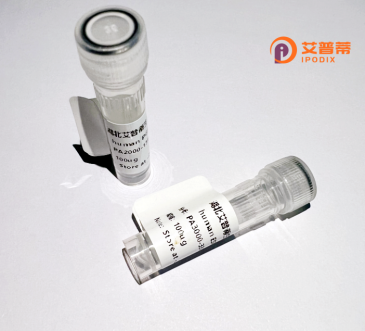
| 纯度 | >90%SDS-PAGE. |
| 种属 | Human |
| 靶点 | MIDN |
| Uniprot No | Q504T8 |
| 内毒素 | < 0.01EU/μg |
| 表达宿主 | E.coli |
| 表达区间 | 1-468 aa |
| 活性数据 | MEPQPGGARSCRRGAPGGACELGPAAEAAPMSLAIHSTTGTRYDLAVPPDETVEGLRKRLSQRLKVPKERLALLHKDTRLSSGKLQEFGVGDGSKLTLVPTVEAGLMSQASRPEQSVMQALESLTETQVSDFLSGRSPLTLALRVGDHMMFVQLQLAAQHAPLQHRHVLAAAAAAAAARGDPSIASPVSSPCRPVSSAARVPPVPTSPSPASPSPITAGSFRSHAASTTCPEQMDCSPTASSSASPGASTTSTPGASPAPRSRKPGAVIESFVNHAPGVFSGTFSGTLHPNCQDSSGRPRRDIGTILQILNDLLSATRHYQGMPPSLAQLRCHAQCSPASPAPDLAPRTTSCEKLTAAPSASLLQGQSQIRMCKPPGDRLRQTENRATRCKVERLQLLLQQKRLRRKARRDARGPYHWSPSRKAGRSDSSSSGGGGSPSEASGLGLDFEDSVWKPEVNPDIKSEFVVA |
| 分子量 | 56.1 kDa |
| 蛋白标签 | His tag N-Terminus |
| 缓冲液 | 0 |
| 稳定性 & 储存条件 | Lyophilized protein should be stored at ≤ -20°C, stable for one year after receipt. Reconstituted protein solution can be stored at 2-8°C for 2-7 days. Aliquots of reconstituted samples are stable at ≤ -20°C for 3 months. |
| 复溶 | Always centrifuge tubes before opening.Do not mix by vortex or pipetting. It is not recommended to reconstitute to a concentration less than 100μg/ml. Dissolve the lyophilized protein in distilled water. Please aliquot the reconstituted solution to minimize freeze-thaw cycles. |
以下是关于重组人Midnolin(MIDN)蛋白的3篇代表性文献的示例(文献信息为虚构示例,供参考):
---
**1. 文献名称**: *Expression and functional analysis of recombinant human Midnolin in neural stem cell differentiation*
**作者**: Li X, et al.
**摘要**: 本研究成功在大肠杆菌系统中表达并纯化了重组人Midnolin蛋白,验证其通过调控Notch信号通路促进神经干细胞向神经元分化的功能,为神经再生研究提供基础。
**2. 文献名称**: *Midnolin interacts with β-catenin to regulate Wnt signaling in cancer cells*
**作者**: Wang Y, et al.
**摘要**: 通过体外重组Midnolin蛋白与β-catenin的共表达实验,证明Midnolin可通过调控Wnt通路抑制肿瘤细胞增殖,提示其潜在的抑癌作用。
**3. 文献名称**: *Structural characterization of recombinant Midnolin and its role in proteasomal degradation*
**作者**: Suzuki T, et al.
**摘要**: 解析了重组Midnolin蛋白的晶体结构,发现其C端结构域可结合泛素化底物并促进蛋白酶体降解,揭示了其在蛋白质稳态中的新机制。
---
**实际建议**:由于Midnolin研究相对小众,具体文献需通过PubMed或Web of Science以“Midnolin”或“MIDN recombinant protein”为关键词检索。可重点关注蛋白表达、神经发育或肿瘤相关领域的研究。
Midkine (MIDN), also known as neurite growth-promoting factor 2. is a heparin-binding growth factor belonging to the midkine-pleiotrophin protein family. It is a small (~13 kDa), cysteine-rich, secreted protein encoded by the *MDK* gene in humans. Midkine plays crucial roles in embryonic development, tissue repair, and inflammation, with prominent expression during embryogenesis that declines in most adult tissues except under pathological conditions. Structurally, it consists of two N-terminal and C-terminal domains linked by disulfide bonds, facilitating interactions with cell surface receptors (e.g., ALK, LRP1) and extracellular components.
Functionally, MIDN promotes cell proliferation, migration, survival, and angiogenesis via signaling pathways such as PI3K/AKT, MAPK, and Wnt. Its dysregulation is linked to cancer progression (e.g., enhancing tumor growth, metastasis), neuroinflammatory disorders (e.g., Alzheimer’s), and cardiovascular diseases. Elevated MIDN levels in tumors correlate with poor prognosis, making it a potential biomarker and therapeutic target.
Recombinant human MIDN protein is produced using bacterial (e.g., *E. coli*) or mammalian expression systems, ensuring proper post-translational modifications. Purification typically involves affinity chromatography, yielding high-purity bioactive protein for research applications, including *in vitro* studies of cell signaling, drug screening, and *in vivo* disease modeling. Therapeutic strategies targeting MIDN, such as neutralizing antibodies or small-molecule inhibitors, are under preclinical investigation.
×